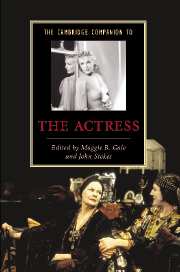Book contents
- Frontmatter
- Introduction
- Part I Turning points
- 1 Revolution, legislation and autonomy
- 2 Spectacle, intellect and authority: the actress in the eighteenth century
- 3 Cultural formations: the nineteenth-century touring actress and her international audiences
- 4 The actress as photographic icon: from early photography to early film
- 5 The actress and the profession: training in England in the twentieth century
- 6 Out of the ordinary: exercising restraint in the post-war years
- 7 Icons and labourers: some political actresses
- Part II Professional opportunities
- Part III Genre, form and tradition
- General reading
- Index
7 - Icons and labourers: some political actresses
from Part I - Turning points
Published online by Cambridge University Press: 28 November 2008
- Frontmatter
- Introduction
- Part I Turning points
- 1 Revolution, legislation and autonomy
- 2 Spectacle, intellect and authority: the actress in the eighteenth century
- 3 Cultural formations: the nineteenth-century touring actress and her international audiences
- 4 The actress as photographic icon: from early photography to early film
- 5 The actress and the profession: training in England in the twentieth century
- 6 Out of the ordinary: exercising restraint in the post-war years
- 7 Icons and labourers: some political actresses
- Part II Professional opportunities
- Part III Genre, form and tradition
- General reading
- Index
Summary
“Both [acting and politics] are about stripping things away. In their different ways, each is about trying to get to the truth.” Glenda Jackson, London mayoral campaign, 2000 / At the climax of István Szabó's film Mephisto the antihero, a careerist star who sells his soul to the Nazis, is trapped in a searchlight beam and cries, 'But I'm only an actor!' He is of course wrong. No one is only an actor, actress, baker or anything else; 'I,' said the Hollywood comedienne Judy Holliday during the McCarthy era, 'accept my responsibilities as a citizen.' Everyone is caught in the choices of their time, and is accountable. Acting is a relatively, sometimes hugely, privileged profession and Simone Signoret, for example, criticised actors' general unwillingness to engage with politics. Today when such figures as Jane Fonda and Vanessa Redgrave speak, angry websites demonise or dismiss them ('Who really cares anything what spews from Jane Fonda's mouth? . . . she is only an actress'), with a frustration born of the fact that cinema (a key tool, Lenin said) made performers literally larger than life and television gained them access to the home. Yet throughout the twentieth century, stage and screen actresses, accepting their responsibilities as influential citizens, organised and spoke out. Two early performances, for example, mapped some possibilities. / Theatres of war and peace / In 1902, the Irish nationalist orator Maude Gonne took the title role in Cathleen ni Houlihan by W. B. Yeats and Augusta Gregory. She played an old woman who inspires peasants to fight the English. She is the spirit of Ireland, and when they rise she transforms into a young woman 'with the walk of a queen', but this metamorphosis was not shown on stage because it was unnecessary: the old lady Maude Gonne played was the flimsiest veil for her own unmistakable presence.
- Type
- Chapter
- Information
- The Cambridge Companion to the Actress , pp. 134 - 154Publisher: Cambridge University PressPrint publication year: 2007



